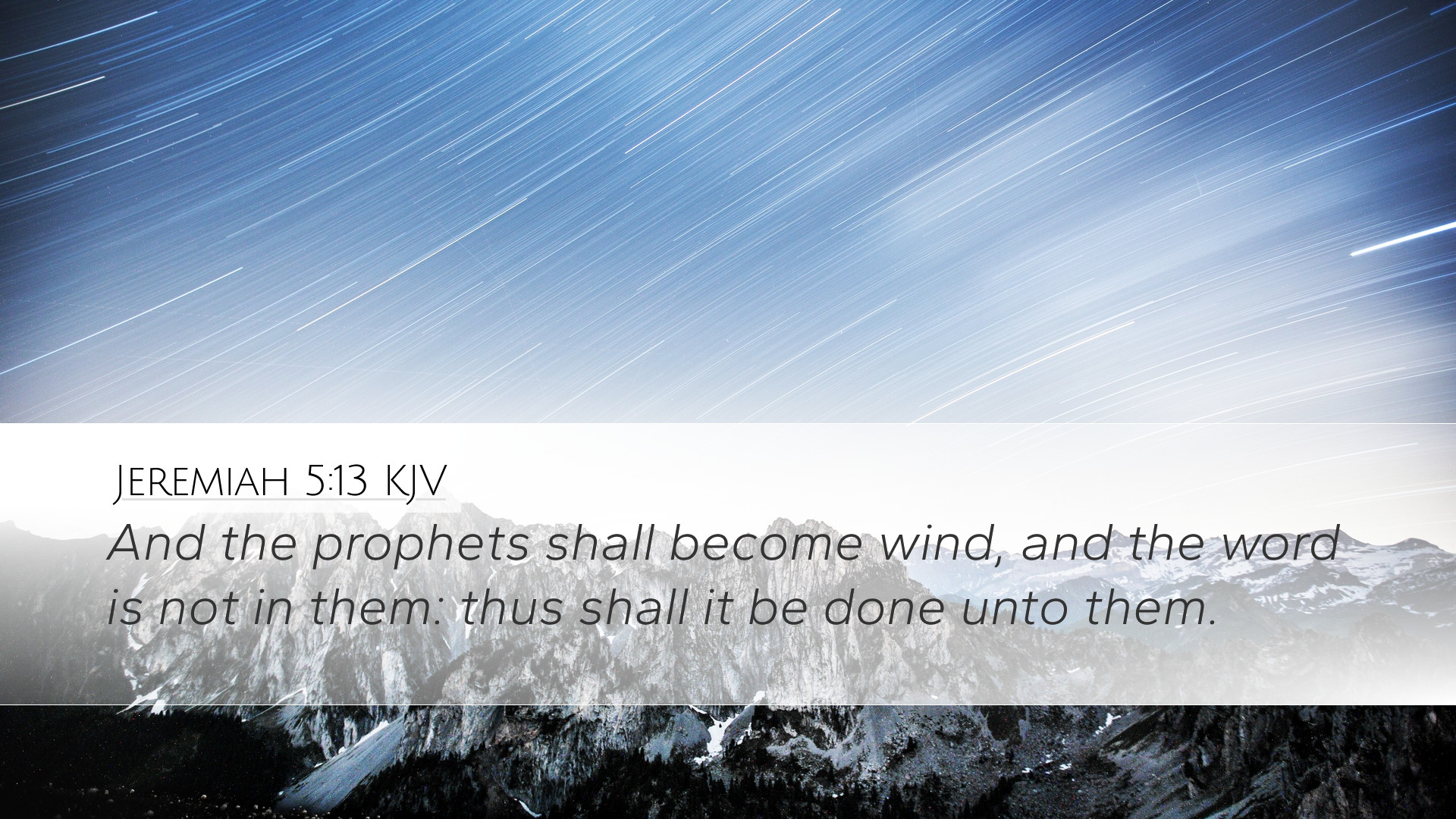Commentary on Jeremiah 5:13
Verse: "And the prophets shall become wind, and the word is not in them: thus shall it be done unto them."
Contextual Overview
This verse is located within the prophetic ministry of Jeremiah, a time marked by significant moral decay and spiritual blindness among the people of Israel. The prophet's role was to relay God’s messages and warnings, yet here, we see a stark contrast—the prophets have become insubstantial, like wind, lacking the divine authority and truth they were meant to convey.
Insights from Public Domain Commentaries
Matthew Henry's Commentary
Henry emphasizes the futility and emptiness of false prophets who lack divine inspiration. He notes that the metaphor of "wind" illustrates their transient and ineffective nature, representing the empty words and deceptive prophecies that offer no real substance or guidance to the people. This emptiness leads to inevitable judgment as the true Word of God is absent among them.
-
Empty Prophecies: Henry points out that the prophets were not just misled; they intentionally strayed from the truth, resulting in prophecies that could do nothing but harm.
-
Judgment Ahead: He illustrates how such a state cannot be tolerated by God, leading to impending judgment upon both the false prophets and the people who heed their lies.
Albert Barnes' Notes on the Bible
Barnes provides a detailed look into the implications of this verse, highlighting the theological consequences of rejecting God’s word. He interprets “the prophets shall become wind” as a judgment against false prophets who have traded the weight of God’s message for public approval.
-
Spiritual Condition: He discusses the spiritual condition of Israel as one that had not just rejected God, but also preferred falsehood over the truth, leading to a lack of divine guidance.
-
The Necessity of True Prophecy: Barnes stresses the importance of recognizing true prophetic utterance—one that conveys God’s will rather than self-serving messages that offer no real hope or guidance.
Adam Clarke's Commentary
Clarke expands on the implications of the metaphor employed in this verse. He critiques the prophets’ failure to deliver authentic messages, instead succumbing to the pressures and desires of the people.
-
Wind as a Symbol: Clarke refers to the 'wind' as a powerful but ultimately fickle element, representing how the words of these prophets would carry no true authority or substance.
-
Consequences of Carelessness: He warns that the careless attitudes of the leaders towards delivering God’s message result not only in personal guilt but also in corporate judgment upon the nation.
Theological Reflections
The verse serves as a poignant reminder of the necessity of fidelity in prophetic ministry. It challenges pastors, students, and theologians to consider the weight of their responsibilities when proclaiming God’s word.
-
Integrity of the Prophetic Voice: The church today must ensure that its prophetic voice remains anchored in the truth of Scripture, allowing no room for personal ambition or worldly influence.
-
Understanding God’s Judgment: The anticipation of God's judgment is a central theme in Jeremiah; modern readers would do well to grapple with the serious implications of living contrary to God’s instructions.
Conclusion
Jeremiah 5:13 serves as a grave warning regarding the dangers of false prophecy and the importance of remaining steadfast in the truth of God’s word. The insights gleaned from historical commentaries remind readers of the timeless nature of these warnings and the imperative to uphold the integrity of God’s message within their communities.


